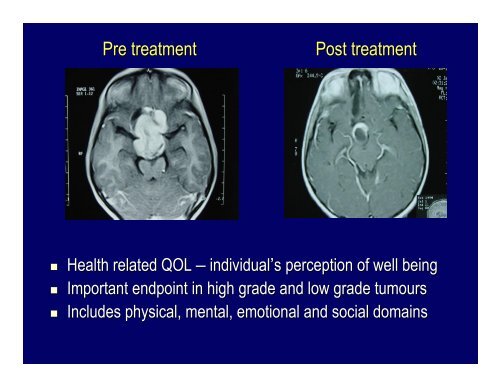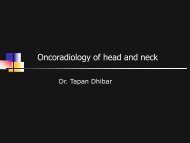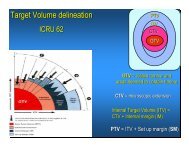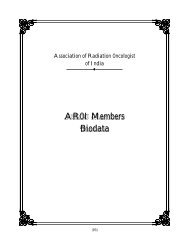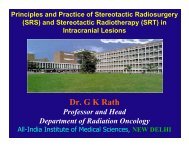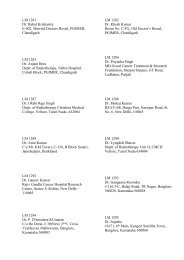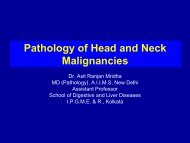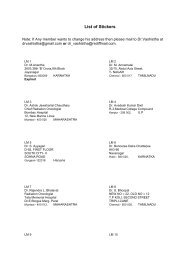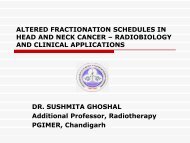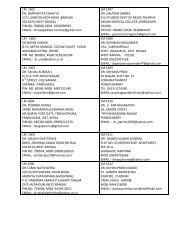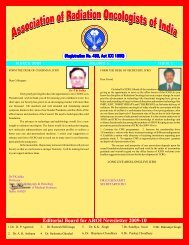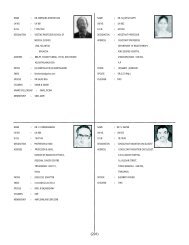Pre treatment Post treatment - AROI
Pre treatment Post treatment - AROI
Pre treatment Post treatment - AROI
Create successful ePaper yourself
Turn your PDF publications into a flip-book with our unique Google optimized e-Paper software.
<strong>Pre</strong> <strong>treatment</strong><br />
<strong>Post</strong> <strong>treatment</strong><br />
<br />
<br />
<br />
Health related QOL – individual’s s perception of well being<br />
Important endpoint in high grade and low grade tumours<br />
Includes physical, mental, emotional and social domains
Quality of life- an important outcome measure<br />
Most of the data on QoL is available in trial setting
Disease<br />
versus<br />
Illness<br />
Observed by physician<br />
Objective signs<br />
Replicable<br />
Affects discrete parts<br />
Affects quantity of life<br />
Dispassionate care<br />
Death (survival)<br />
Experienced by patient<br />
Subjective symptoms<br />
Unique<br />
Affects whole person<br />
Affects quality of life<br />
Compassionate care<br />
Suffering<br />
Reading 1977 Med Clinics N Amer 61(4): 703-710<br />
710
Shift of focus<br />
The person with CANCER<br />
Vs<br />
The PERSON with cancer<br />
A small difference with a big effect
QOL Tools in brain tumours<br />
EORTC QLQ - BN20<br />
Patients sometimes report that they have the following symptoms. Please indicate the extent<br />
to which you have experienced these symptoms or problems during the past week.<br />
________________________________________________________________________________<br />
During the past week: Not at A Quite Very<br />
All Little a Bit Much<br />
31. Did you feel uncertain about the future 1 2 3 4<br />
32. Did you feel you had setbacks in your condition 1 2 3 4<br />
33. Were you concerned about disruption of family life 1 2 3 4<br />
34. Did you have headaches 1 2 3 4<br />
35. Did your outlook on the future worsen 1 2 3 4<br />
36. Did you have double vision 1 2 3 4<br />
37. Was your vision blurred 1 2 3 4<br />
38. Did you have difficulty reading because of your vision 1 2 3 4<br />
39. Did you have seizures 1 2 3 4<br />
40. Did you have weakness on one side of your body 1 2 3 4<br />
41. Did you have trouble finding the right words to<br />
express yourself 1 2 3 4<br />
42. Did you have difficulty speaking 1 2 3 4<br />
43. Did you have trouble communicating your thoughts 1 2 3 4<br />
44. Did you feel drowsy during the daytime 1 2 3 4<br />
45. Did you have trouble with your coordination 1 2 3 4<br />
46. Did hair loss bother you 1 2 3 4<br />
47. Did itching of your skin bother you 1 2 3 4<br />
48. Did you have weakness of both legs 1 2 3 4<br />
49. Did you feel unsteady on your feet 1 2 3 4<br />
50. Did you have trouble controlling your bladder 1 2 3 4<br />
© Copyright 1994 EORTC Study Group on Quality of Life. (phase III module)<br />
Core questionnaire (30 qtns) Specific brain module (20 qtns)
Quality of Life in recurrent gliomas<br />
EORTC QLC 30 & BCM 20<br />
Yung BJC 2000;83:588-93
Prospective QOL assessment<br />
in the EORTC TMZ study<br />
Taphoorn Lancet Oncol 2005;6:937-44
Problems of QOL in routine practice<br />
• Social and cultural factors<br />
• Indifference of treating physician towards QOL issues<br />
• Non availability of QOL tools in native languages<br />
• Longitudinal prospective studies on late sequelae and QOL<br />
sparse<br />
• Most of the data retrospective/cross-sectional<br />
sectional<br />
• QOL in routine practice relatively unknown and difficult to do<br />
TMH QOL study in adult Brain<br />
tumour patients<br />
• Longitudinal<br />
• Consecutive
Study Design<br />
<br />
Accrual<br />
Adult patients (age>18years) with primary brain tumours seen<br />
consecutively from 1 st Jan 2003 to 31 st December 2003<br />
(all patients had some surgical intervention)<br />
<br />
Prospective Evaluation<br />
Complete neuro-oncological oncological data<br />
EORTC Questionnaire-QLQ QLQ C30 (QOL)<br />
EORTC approved translated Brain Cancer Module (BN 20)<br />
(Hindi and Marathi)
Translation to Hindi and Marathi and Validation<br />
• Detailed methodology, as outlined by<br />
EORTC<br />
• First, forward translations by 2 native<br />
speakers<br />
• Intermediate questionnaire<br />
•Back translations by 2 independent<br />
people<br />
• Application in 10 patients and evaluate<br />
their responses as a pilot testing<br />
• Send to EORTC & incorporate the<br />
changes suggested<br />
• Submit final questionnaire to EORTC for<br />
acceptance and ratification<br />
• Available at the EORTC website,<br />
copyrighted<br />
Budrukkar 2006 (In press)
Patient characteristics<br />
Total no of patients accrued: 257<br />
5% 1%<br />
42%<br />
52%<br />
• KPS<br />
80 and above: 183 (71%)<br />
50-70:<br />
57 (22%)<br />
60years NK<br />
<br />
Male : Female :: 173 : 84<br />
•<br />
4<br />
23<br />
<br />
Literacy status:<br />
Illiterate: 36 (14%)<br />
Primary education: 31 (12%)<br />
Secondary education: 91 (35%)<br />
Higher sec. education: 48 (19%)<br />
College and above: 46 (18%)<br />
Not available: 5 (2%)<br />
Benign tumours Low grade gliomas Malignant tumours others<br />
27
Evaluations<br />
<br />
<br />
<br />
<br />
Questionnaire filled by patients themselves: 165 (64%)<br />
Assistance required due to neurological condition: 37 (14.5%)<br />
Assistance required due to illiteracy: 33 (13%)<br />
Assistance required for other causes: 20 (8%)<br />
Time of evaluation<br />
Visit 1: At first assessed in the Clinic (n=243 )<br />
Visit 2:<br />
Visit 3:<br />
Visit 4:<br />
At the conclusion of Radiation therapy (n=147)<br />
On follow up at 6 weeks to 3 months (n=114)<br />
On follow up at 6 months (n=62)<br />
Visit 5: On follow up at 9-129<br />
months (n=50)<br />
Died<br />
Lost<br />
No RT/Out RT<br />
Administrative<br />
No.<br />
21<br />
14<br />
30<br />
31
Domains<br />
Role Functioning<br />
Social Functioning<br />
BN 20<br />
Future Uncertainty<br />
Visual Disorder<br />
Motor Deficit<br />
Communication<br />
Baseline QOL Scores<br />
QLQC30<br />
Physical Functioning<br />
Emotional Functioning<br />
Cognitive Functioning<br />
No of pts.<br />
243<br />
242<br />
240<br />
241<br />
240<br />
243<br />
243<br />
243<br />
243<br />
QLQ: higher score - better<br />
Mean<br />
80<br />
78<br />
65<br />
70<br />
70.5<br />
19<br />
18<br />
28.5<br />
31<br />
Std Deviation<br />
20<br />
26<br />
27<br />
28.5<br />
33<br />
BN 20: lower score - better<br />
20<br />
19<br />
22.5<br />
26<br />
Jalali WFNO/EANO Edinburgh 2005
Baseline Global QOL<br />
60<br />
60<br />
54<br />
62<br />
60<br />
61 62<br />
50<br />
58<br />
40<br />
30<br />
39<br />
56<br />
54<br />
52<br />
52<br />
20<br />
50<br />
48<br />
10<br />
46<br />
0<br />
18-40 41-60 >60<br />
Age<br />
Benign Low grade Malignant<br />
Tumour type<br />
70<br />
63<br />
57<br />
60<br />
50<br />
37<br />
40<br />
30<br />
20<br />
10<br />
0<br />
Iliterate Primary/seconday Higher se/college<br />
80<br />
70<br />
60<br />
50<br />
40<br />
30<br />
20<br />
10<br />
0<br />
73<br />
59<br />
53<br />
Low Middle High<br />
Literacy<br />
Socioeconomic status
Minimum score: 0<br />
Global QOL<br />
Maximum score:100<br />
90<br />
85<br />
80<br />
75<br />
70<br />
65<br />
60<br />
95% CI<br />
55<br />
50<br />
N =<br />
236<br />
144<br />
112<br />
61<br />
50<br />
QLV1<br />
QLV2<br />
QLV3<br />
QLV4<br />
QLV5<br />
V1 and V3: p = 0.043<br />
HIGH SCORE IS BETTER
Global QOL and performance status<br />
90<br />
80<br />
70<br />
Minimum score: 0<br />
Maximum score:100<br />
QoL Global Score<br />
60<br />
50<br />
40<br />
30<br />
20<br />
10<br />
KPS > 80<br />
KPS-50-<br />
70<br />
0<br />
V1 V2 V3 V4<br />
KPS 50-70:<br />
Baseline V1 & 3 months V3: p= 0.012<br />
HIGH SCORE IS BETTER
Global QOL and Tumour type<br />
90<br />
80<br />
70<br />
60<br />
50<br />
40<br />
30<br />
20<br />
V1<br />
V2<br />
V3<br />
V4<br />
V5<br />
10<br />
0<br />
Benign Tumours Low grade tumours Malignant tumours<br />
HIGH SCORE IS BETTER
BN 20 Domains<br />
40<br />
35<br />
30<br />
BN 20 Score: Range 0 0-100<br />
25<br />
20<br />
15<br />
10<br />
5<br />
0<br />
V1 V2 V3 V4 V5<br />
Visual Disorder Motor dysfunction Communication deficit<br />
p =0.04 V1 & V3<br />
p=0.000 V1 & V4<br />
p=0.015 V1 & V2<br />
LOW SCORE IS BETTER
Symptom scales: BN 20<br />
BN 20 Score: Range 0 0-100<br />
35<br />
30<br />
25<br />
20<br />
15<br />
10<br />
5<br />
V1<br />
V2<br />
V3<br />
V4<br />
V5<br />
0<br />
Headache Drowsiness Seizure<br />
Drowsiness: : p = 0.001 V1& V2<br />
Seizures: : p = 0.009 V1& V3<br />
Other symptom scales: p=ns<br />
LOW SCORE IS BETTER
Conclusions<br />
<br />
<br />
<br />
<br />
<br />
<br />
<br />
<br />
Patients with brain tumours before starting adjuvant therapy have e relatively low quality of life,<br />
Age more than 60, malignant tumours, low socioeconomic status and d poor education are likely<br />
factors to be associated with poor QOL scores at baseline<br />
Brain Cancer module domains seem to be more appropriate in measuring QOL than QLC core<br />
questionnaire<br />
Radiotherapy (post-operative operative and upfront) improves global QOL of patients, especially ly in motor<br />
and communication deficits<br />
Maximum improvement seems to be seen in patients with baseline low l<br />
performance status and<br />
malignant tumours<br />
There is a transient deterioration in drowsiness and nausea and vomiting following radiotherapy<br />
QOL evaluation in routine practice is feasible; however needs dedicated dicated personnel and follow up<br />
evaluations in controlled fashion<br />
Efforts should be made to minimise administrative errors<br />
Jalali NeuroOncology 2005
Acknowledgements<br />
<br />
<br />
<br />
<br />
<br />
Rakesh Jalali<br />
Rashmi Kamble<br />
Sachin Parab<br />
Anagha Kakade<br />
Kalpesh (deceased)<br />
www.tatamemorialcentre.com<br />
www.braintumourindia.com
www.braintumourindia.com


